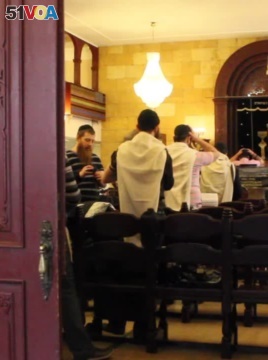June 06,2014
ODESSA, UKRAINE — The unrest in Ukraine in recent months has put the country’s Jewish community under new pressures, with a surge of anti-Semitic graffiti and at least one attack on a synagogue. Odessa is one of the main centers of Jewish life in the country.
On a typical weekday, some of Odessa’s Jews gather for morning prayers as they have for generations. Ukraine is home to 70,000 practicing Jews, the fourth largest community in Europe.

But at times of tension like Ukraine has experienced in recent months, anti-Semitic feelings come out, like this graffiti. It reads “Death to Jews.” It’s at the site of the fire on May 2nd in Odessa, in which dozens of pro-Russian demonstrators were killed.
But Odessa’s Chief Rabbi, Abraham Wolff, says the Jewish community is divided on the Russia-Ukraine issue, just like the broader community.
“I think that the Jewish question has really no role in this war. Many people think that there is a Jewish question because they are constantly trying to involve Jews on the grounds of our nationhood. But this is absolutely not true," said Wolff.
Still, Rabbi Wolff was involved in painting over some anti-Semitic graffiti recently, along with the regional leader of the new Right Sector political party, who said his group had nothing to do with it.
And the rabbi admits to having an exit plan for Odessa’s Jews, although he says he doesn’t expect to have to use it.
“There are dangers, but they’re not imminent. And I don’t think they will become real. Naturally, we have some problems - anti-Semitism, fascism - like in every country," he said.
Anti-Semitism is deeply rooted in some parts of Ukraine. There were anti-Jewish pogroms in the early 20th century, and this ravine in Kyiv was the scene of one of the worst Nazi massacres of World War II. More than 30,000 Jews were lined up, shot and buried at Babi Yar. Today, it draws few visitors, and children use the ravine as a shortcut on their way home from school.
At the Kyiv International Institute of Sociology, Professor Volodymyr Paniotto says 20 years of research indicates anti-Semitism spiked about six years ago. But he says non-Jewish Ukrainians don’t have significantly different views on Jews than on most other ethnic groups.
“We consider that mainly it’s connected with the worsening of the situation. The level of poverty was increasing. And when the situation became worse, people tried to find some enemy," said Paniotto.
Paniotto says the current crisis has also made some people look for scapegoats, but he does not think that represents a long term change for the Jews of Ukraine.